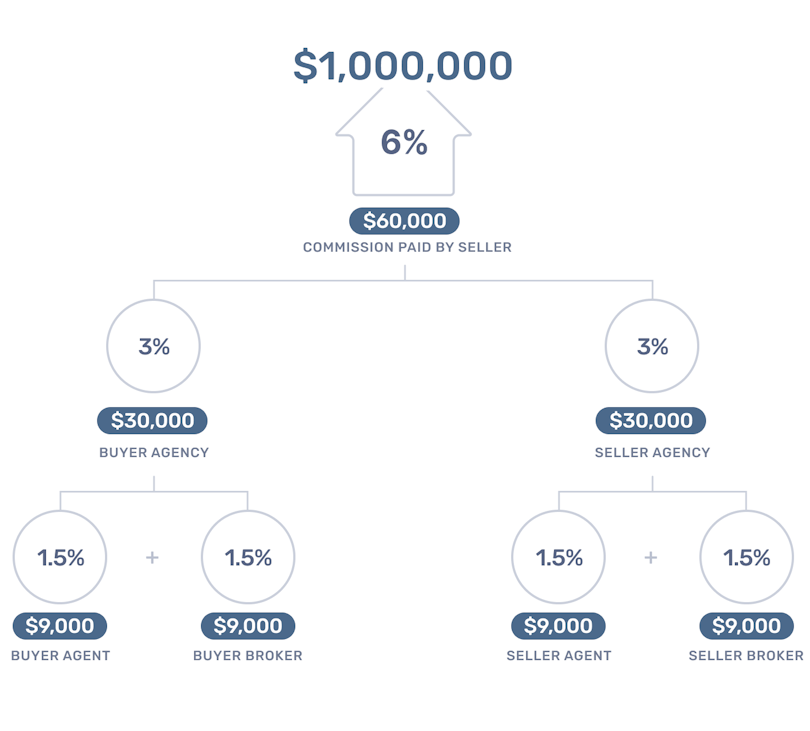According to one study, the median income for an agent in the United States as of 2020 was $42,246 while the top ten percent earned $64,198, more than 50% more. This income is primarily from the commission, but real estate agents involved in selling a home only get paid a commission when the home sells.
Typically, a sale involves two agents: a listing agent representing the seller, and a buyer’s agent representing the buyer. These agents split the total commission from the sale.
In most cases, the seller is responsible for paying the fees for both their agent and the buyer’s agent out of the proceeds of the sale. Altogether, this generally comes to 5%–6% of the final sale price of the home.
Curious how much you'll pay in realtor fees on the sale of your home? Get an idea of your property's current market value with our comparative market analysis!
Match with top-rated agents from brand-name brokerages, like Keller Williams and RE/MAX, and request a free CMA today! Sellers will save thousands in realtor commissions with pre-negotiated 1.5% listing fees.
Clever's service is 100% free with zero obligation. Interview as many agents as you like until you find the perfect fit — or walk away at any time.
What is realtor commission?
Realtor commission is the compensation real estate agents receive for helping their clients successfully buy or sell a home.
Buyers and sellers compensate agents for the work they do to get a transaction to closing.
- A buyer’s agent helps find the right home, at the right price, in the buyer’s desired time frame.
- A seller’s agent lists and markets the home, screens for buyers, and negotiates offers.
In 2019, 11% of buyers and sellers did not use a real estate agent, proving that it’s possible to buy and sell a home without help. However, the remaining 89% worked with an agent to help them either list, market, and sell their home or to help them find, evaluate, and buy their home. The number of people using an agent has been growing steadily since 2001, leading us to conclude that agents continue to deliver value to consumers as part of the real estate transaction.
Do sellers pay realtor fees?
A seller pays the realtor fees for both parties. The money comes from the proceeds of the home, so no additional funds are needed from the buyer’s pocket to cover their agent.
However, there are multiple ways to look at the question of "who pays realtor fees."
In "Incentives and Performance in Real Estate Brokerage," a pair of scholars argued that sellers incorporate the commission into the price of the home, so the buyer is indirectly paying for at least part of the fee. This is supported by a 2005 paper which showed that home prices are lower in sales that don’t involve agents.
According to a 2019 study, realtor commissions are a transaction cost for both sides. It’s convenient to roll this cost into the price of the home and the mortgage, but it diminishes the savings that a seller amasses through home appreciation by approximately 25%.
» MORE: Do sellers pay buyer’s agent commission?
Why is a commission model good for home sellers?
A percentage-based commission model motivates agents to sell the home quickly and for the highest price possible.
The agent only gets paid when the home sells. If the agent fails to bring an offer that the seller accepts, they won’t get paid and will lose all the time and money they’ve invested in marketing the home.
With a percentage-based fee, the agent earns more when the home sells for a higher price. They stand to gain a small, but often meaningful, bonus when they fetch a higher offer.
How is an agent’s commission determined?
As a seller, you negotiate your agent’s commission up front before they list the home for sale. Usually, you’ll also agree on a "buyer’s agent commission" — the fee you’re offering to a buyer’s agent who brings a client to purchase your home.
Once you agree on a commission rate with your agent, it’s recorded in a contract called a "listing agreement." In addition to fees, the listing agreement outlines all the terms under which you authorize the agent to find a buyer for your home.
Q: Does an exclusivity agreement affect commissions?
A: An exclusivity agreement gives the agent exclusive rights to market your home and collect payment when it sells. In some rare cases, you might owe a commission even when the home doesn’t sell. Most often, this clause is used when the agent finds a ready, willing, and able buyer, but the seller changes their mind and refuses to sell.
Q: Can negotiating commissions affect services?
A: If you negotiate on fees, your agent may try to negotiate on service by reducing the services they provide, asking you to cover some of their marketing expenses, or extending the length of the listing agreement. You may have more luck if nearby homes are selling very quickly.
Try Clever's free agent matching service: compare top agents in your market, get built-in commission savings. Click below to view agents in your area and see how much you could save!
When do agents receive their commission?
Agents are paid when the home is sold and the transaction is completed. In a real estate transaction, this is called a "closing" or "settlement".
At closing, a third party — typically a title or escrow company — facilitates the transaction, preparing closing statements and writing checks to the agent’s broker out of the sale proceeds.
How do the agents share their commission?
A real estate commission is usually shared evenly between a buyer’s agent and seller’s agent. Each agent shares their commission with the broker they work for, giving them as much as half of their share. With a starting total commission of 6%, this means that each agent would end up with a 1.5% commission.

What is dual agency?
Dual agency is when a real estate agent represents both the buyer and seller for the same home. Dual agency is legal in 43 states (including DC), but the Federal Trade Commission (FTC) does not recommend it for first-time buyers and sellers. Dual agency compromises buyer and seller interests because one agent is representing both sides of a transaction.
» MORE: What are dual agents in real estate?
Is a real estate commission worth it for the seller?
Paying a real estate agent is worth it for sellers because it often translates into higher home prices. The value a full-service agent offers comes from years of experience working on particular types of properties, understanding an area, completing transactions, and navigating the complexity. This experience translates into higher home prices. A recent study found that sellers received 5.82% more money for a home when using an agent, compared to selling it on their own.
The work of a full-service agent includes:
- Prospecting for clients
- Preparing client proposals including pricing
- Listing and marketing a home to find buyers
- Negotiating offers and advising the seller
- Getting the home from an accepted offer to closing or settlement
Alternatives to a percentage-based commission
Alternatives to percentage-based commissions for realtors exist to address a growing market of do-it-yourself sellers and consumers looking for reduced fees. Every alternative compensation structure has trade-offs, and we strongly encourage consumers to ask plenty of questions and ensure they have a good understanding of the pricing and services offered by each one.
Alternatives to percentage-based commissions include:
- MLS-only service: For a small fee, usually paid up front, an agent can list a property on the multiple listing service (MLS). Sellers that don’t use an agent often rely on this service to list their property.
- Flat-fee agents: People wanting to save some money find flat-fee agents appealing to work with. Before working with a flat-fee agent, understand all the costs and terms. Then, read recent online reviews of the flat fee company and its practices.
- Salaried agents: These agents are paid a salary, like most employees. The brokerage still charges a commission for selling the home. The agent isn’t worried about getting paid. That lets the agent devote more time to the property, but reduces their incentive to get it sold quickly.
Key takeaway
A real estate agent works to bring a buyer and seller together. For the transaction, the agent charges a commission or percentage of the sale price. Agents get paid when a home sells and ownership is transferred. The buyer’s agent and seller’s agent split the commission amongst themselves and with their brokers.



